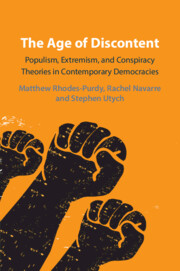Book contents
- The Age of Discontent
- The Age of Discontent
- Copyright page
- Dedication
- Contents
- Figures
- Tables
- Acknowledgements
- Abbreviations
- 1 Introduction
- 2 Left Behind vs. Backlash
- 3 Affective Political Economy
- 4 Affective Political Economy and Political Discontent
- 5 Frozen Parties, Failing Markets
- 6 Austerity, Regionalism, and Dueling Populisms in Spain
- 7 Corruption, Populism, and Contentious Politics in Brazil and Chile
- 8 The Dogs That Did Not Bark
- 9 Populism in Power
- 10 Conclusions
- References
- Index
4 - Affective Political Economy and Political Discontent
An Experimental Analysis
Published online by Cambridge University Press: 02 March 2023
- The Age of Discontent
- The Age of Discontent
- Copyright page
- Dedication
- Contents
- Figures
- Tables
- Acknowledgements
- Abbreviations
- 1 Introduction
- 2 Left Behind vs. Backlash
- 3 Affective Political Economy
- 4 Affective Political Economy and Political Discontent
- 5 Frozen Parties, Failing Markets
- 6 Austerity, Regionalism, and Dueling Populisms in Spain
- 7 Corruption, Populism, and Contentious Politics in Brazil and Chile
- 8 The Dogs That Did Not Bark
- 9 Populism in Power
- 10 Conclusions
- References
- Index
Summary
This chapter tests every step of the book’s theoretical framework using survey experiments. It uses profiles of three hypothetical citizens: Left Leaner, Right Leaner, and Tuned Out. As a narrative device to show how the theory is tested, the chapter then takes these citizens through the steps of our theory using experiments, which use writing exercises, videos, and text vignettes as treatments. The results of these analyses are presented using simple graphs and figures that are relatively understandable for readers with limited statistical expertise. We find that economic discontent does significantly increase populism, regime antipathy, and conspiracism, and that these effects are mediated through cultural discontent, resentment, and (in the case of conspiracism) anxiety, as expected. The chapter further shows that economic discontent increased negative intergroup attitudes, but only among conservatives.
- Type
- Chapter
- Information
- The Age of DiscontentPopulism, Extremism, and Conspiracy Theories in Contemporary Democracies, pp. 71 - 94Publisher: Cambridge University PressPrint publication year: 2023



